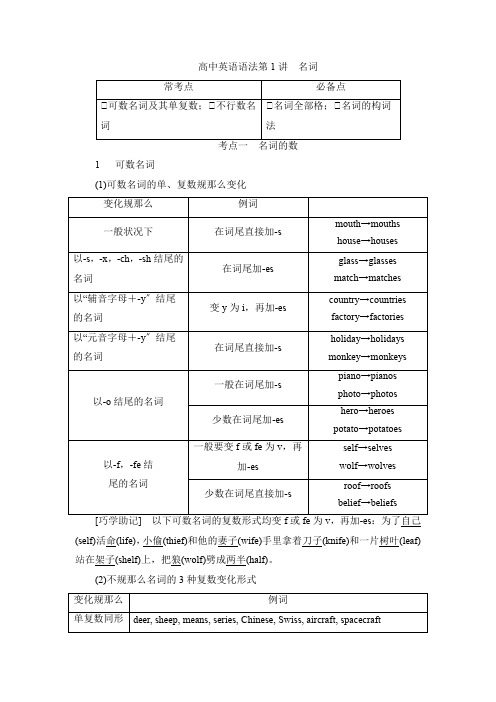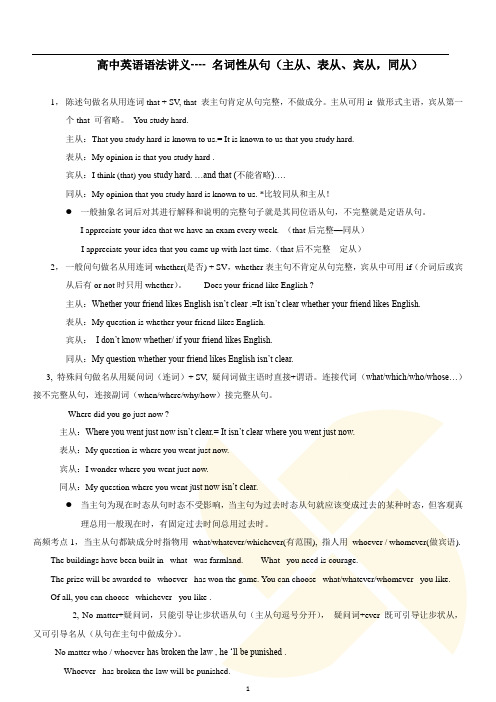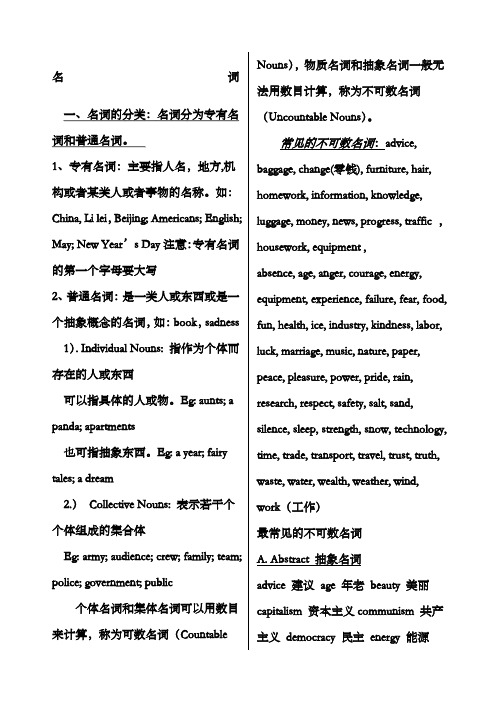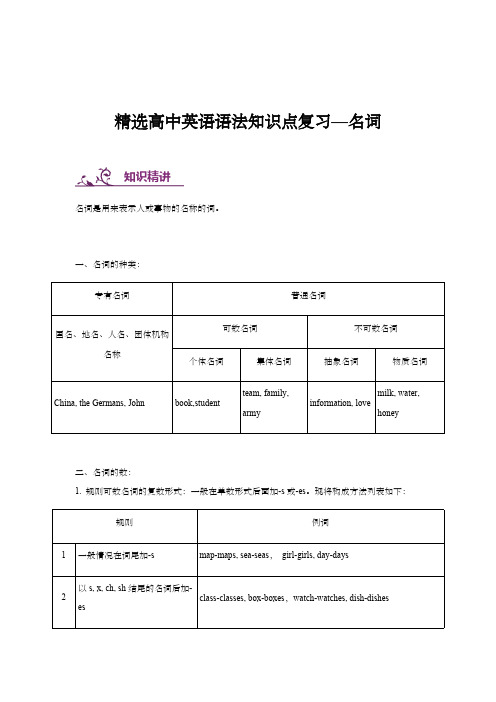高中英语语法讲义——名词
高三英语一轮复习语法第1讲名词的数格构词法考点讲义

高中英语语法第1讲名词1 可数名词(1)可数名词的单、复数规那么变化:为了自己(self)活命(life),小偷(thief)和他的妻子(wife)手里拿着刀子(knife)和一片树叶(leaf)站在架子(shelf)上,把狼(wolf)劈成两半(half)。
(2)不规那么名词的3种复数变化形式一种鱼时,其单复数形式相同。
(2)people指“人们〞时单复数同形;指“民族〞时,其复数为peoples。
(3)合成名词的2种复数形式①假设有中心词,那么把中心词变成复数;假设无中心词,那么把最终一个词变成复数。
passerby→passersby, sisterinlaw→sistersinlaw, grownup→grownups①“man/woman+n.〞变复数时,作定语的man/woman和中心词都要变复数,如women engineers。
对点练1写出以下名词的复数形式①sheep—sheep①dish—dishes①knife—knives①story—stories①tomato—tomatoes2 不行数名词(1)常见的不行数名词一般来说,物质名词和抽象名词是不行数的,因此没有复数形式,一般也不能用a或an修饰。
通常只用作不行数的名词有:milk, music, homework, housework, weather, news, butter, information, bread, advice, progress, orange(橙汁), meat, equipment, fun, luggage, luck, work(工作), traffic, furniture, wealth, word(消息), room(空间), man(人类)等。
[名师点津]word意为“消息〞、room意为“空间〞、man意为“人类〞时,通常不带任何修饰词。
高中英语语法讲义——名词性从句(主从、表从、宾从,同从)

高中英语语法讲义---- 名词性从句(主从、表从、宾从,同从)1,陈述句做名从用连词that + SV, that 表主句肯定从句完整,不做成分。
主从可用it 做形式主语,宾从第一个that 可省略。
You study hard.主从:That you study hard is known to us.= It is known to us that you study hard.表从:My opinion is that you study hard .宾从:I think (that) you study hard. …and that (不能省略)….同从:My opinion that you study hard is known to us. *比较同从和主从!●一般抽象名词后对其进行解释和说明的完整句子就是其同位语从句,不完整就是定语从句。
I appreciate your idea that we have an exam every week. (that后完整—同从)I appreciate your idea that you came up with last time.(that后不完整---定从)2,一般问句做名从用连词whether(是否) + SV,whether表主句不肯定从句完整,宾从中可用if(介词后或宾从后有or not时只用whether)。
Does your friend like English ?主从:Whether your friend likes English isn’t clear .=It isn’t clear whether your friend likes English.表从:My question is whether your friend likes English.宾从:I don’t know whether/ if your friend likes English.同从:My question whether your friend likes English isn’t clear.3, 特殊问句做名从用疑问词(连词)+ SV, 疑问词做主语时直接+谓语。
高中英语语法名词

名词一、名词的分类:名词分为专有名词和普通名词。
1、专有名词:主要指人名,地方,机构或者某类人或者事物的名称。
如:China, Li lei,Beijing; Americans; English; May; New Year’s Day注意:专有名词的第一个字母要大写2、普通名词:是一类人或东西或是一个抽象概念的名词,如:book,sadness 1). Individual Nouns: 指作为个体而存在的人或东西可以指具体的人或物。
Eg: aunts; a panda; apartments也可指抽象东西。
Eg: a year; fairy tales; a dream2.)Collective Nouns: 表示若干个个体组成的集合体Eg: army; audience; crew; family; team; police; government; public个体名词和集体名词可以用数目来计算,称为可数名词(Countable Nouns),物质名词和抽象名词一般无法用数目计算,称为不可数名词(Uncountable Nouns)。
常见的不可数名词:advice, baggage, change(零钱), furniture, hair, homework, information, knowledge, luggage, money, news, progress, traffic ,housework, equipment ,absence, age, anger, courage, energy, equipment, experience, failure, fear, food, fun, health, ice, industry, kindness, labor, luck, marriage, music, nature, paper, peace, pleasure, power, pride, rain, research, respect, safety, salt, sand, silence, sleep, strength, snow, technology, time, trade, transport, travel, trust, truth, waste, water, wealth, weather, wind, work(工作)最常见的不可数名词A. Abstract 抽象名词advice 建议age 年老beauty 美丽capitalism 资本主义communism 共产主义democracy 民主energy 能源fun 乐趣happiness 幸福help 帮助honesty 诚实information 信息justice 正义kindness 善knowledge 知识laughter 笑声liberty 自由life 生命、生物、活力play 玩recreation 娱乐strength 实力trouble 麻烦truth 真理virtue 美德wisdom 智慧work 工作youth 青年B. Matter, material 物质名词air 空气beer 啤酒blood 血液bread 面包butter 黄油cake 蛋糕chalk 粉笔cheese 奶酪coal 煤coffee 咖啡electricity 电力fog 雾fish 鱼gold 黄金grass 草hair 头发ice 冰ink 油墨iron 铁juice 果汁lumber 木材meat 肉milk 牛奶oil 油oxygen 氧气paper 纸rain 雨rice 水稻smoke 烟雾snow 雪soap 肥皂soup 汤sugar 糖tea 茶water 水wine 葡萄酒wood 木C. Generic terms 属类business 商业change 零钱equipment 设备fruit 水果furniture 家具jewelry 珠宝luggage 行李machinery 机械mail 邮件money 金钱news 新闻propaganda 宣传scenery 风景slang 俚语stationery 文具traffic 交通vegetation 植被weather 天气D. Subject matter 学科architecture 建筑art 艺术chemistry 化学civics 市政学economics 经济学engineering 工程English 英语geology 地质学grammar 语法history 历史literature 文学mathematics 数学music 音乐philosophy 哲学physics 物理学science 科学technology 技术vocabulary 词汇E. Sports and recreation 运动和休闲baseball 棒球basketball 篮球bridge 桥牌camping 露营dancing 跳舞drinking 饮酒football 足球golf 高尔夫hiking 远足hockey 曲棍球homework 家庭作业hunting 狩猎opera 歌剧sailing 帆船singing歌唱softball 垒球swimming 游泳television 电视traveling 旅行volleyball 排球F. Countable and non-countable nouns 一词多意要具体对待age 年老/年龄baseball (and other balls) 棒球(运动)/(一个)棒球(和其他球)beer (and other drinks) 啤酒(物质)/(一杯)啤酒(和其他饮料)business 商业/公司change 找零/变改company 陪伴/公司dope 毒品/傻瓜glass 玻璃/玻璃杯、眼镜iron 铁/熨斗paper 纸/文件play 玩耍/戏剧room 空间/房间smoke 烟雾/香烟tape 胶带(材料)/胶带物体)tea 茶叶/下午茶work 工作/着作youth 青春/青年人3). Material Nouns: 指无法分为个体的物质。
高中英语语法专题讲义_名词

英语语法专题讲义-名词(一)、名词的种类:1、专有名词:1)China, Japan, Beijing, London, Tom, Jack(不加冠词)2)the Great Wall, the Yellow River, the People’s Republic of China, the United States等。
(由普通名词构成的专有名词,要加定冠词。
)2、普通名词1)不可数名词注意:•不可数名词前一般不加冠词,尤不加不定冠词:若加a(an)则使之具体化了。
如:have a wonderful time.‚不可数名词作主语,谓语动词用第三人称单数形式。
ƒ不可数名词一般无复数形式。
部分物质名词在表不同类别时,可用复数形式。
如:fishes, newspapers, waters, snows……| | | |各种各样的鱼各种报纸河湖、海水积雪…有些抽象名词也常用复数,变为可数的具体的事物。
如:times时代,works著作,difficulties 困难…在表数量时,常用“of”词组来表示。
如:a glass of milk, a cup of tea, two pieces of paper….2)可数名词:•可数名词除用复数形式表一类之外,一般都要加冠词:A birdThe frog is a kind of hibernating animal.Vegetables sold at this shop are usually fresh.‚有复数形式:a)规则变化——加“s”或“es”(与初中同,略)b)不规则变化——child (children), foot (feet), tooth (teeth), man (men),woman (women), mouse (mice), goose (geese), Englishman (Englishmen),phenomenon(phenomena)…注意:c)单、复数同形:sheep, deer, Chinese, Japanese, fish(同一种鱼)……。
精选高中英语语法知识点复习—名词(解析版)

只修饰不可数名词
much, a little, a bit of, a great/good deal of, a great/large/small amount of
既可修饰可数名词又可修饰不可 the, one's, some, any, no, all, a lot of, lots of, plenty of, a large quantity
以辅音字母加 y 结尾的名词,
4
party-parties, family-families, story-stories, city-cities
变 y 为 i 加-es
以元音字母加 y 结尾的名词,
5
toy-toys, boy-boys,day-days, ray-rays, Henry-Henrys
es
变-f 和-fe 为 v 再 leaf-leaves, thief-thieves, knife-knives, wife-wives,wolf-wolves,
以-f 或-fe 加-es 3
结尾的词
half-halves
加-s
chief-chiefs, proof-proofs, roof-roofs
以元音字母加-o 结尾的名词加
7
radio-radios, bamboo-bamboos, zoo-zoos
-s
8 以-th 结尾的名词加-s
trut month-months, path-paths
2. 不规则可数名词复数:
改变名词中的元音字母或
1
man-men, woman-women, foot-feet, goose-geese, mouse-mice
或专有名词以 y 结尾的,加-s
高中英语名词考点

高中英语名词考点在高中英语的学习中,名词是一个重要的语法板块。
掌握好名词的相关考点,对于提升英语语言能力和应对考试都具有重要意义。
接下来,让我们一起深入探讨高中英语名词的常见考点。
一、名词的分类名词可以分为专有名词和普通名词。
专有名词指特定的人、地方、机构等的名称,如 China(中国)、New York(纽约)、Microsoft(微软)等,其首字母通常要大写。
普通名词又可以分为可数名词和不可数名词。
可数名词有单数和复数形式,如 book(书,单数)、books(书,复数)。
而不可数名词没有复数形式,如 water(水)、information(信息)。
二、可数名词的复数形式可数名词的复数形式变化规则多样。
一般情况下,直接在名词后加s,如 cats(猫)、dogs(狗)。
以 s、x、ch、sh 结尾的名词,加 es,如 buses(公共汽车)、boxes(盒子)、watches(手表)、dishes(盘子)。
以辅音字母+ y 结尾的名词,把 y 变为 i 再加 es,如 babies(婴儿)、cities(城市);但以元音字母+y 结尾的名词,直接加s,如 toys(玩具)、days(天)。
以 f 或 fe 结尾的名词,把 f 或 fe 变为 v再加 es,如 leaves(树叶)、knives(刀);但有些词直接加 s,如roofs(屋顶)。
还有一些不规则的名词复数形式需要特别记忆,如 man men(男人)、woman women(女人)、child children(孩子)、foot feet (脚)、tooth teeth(牙齿)等。
三、不可数名词的量化不可数名词不能用具体的数字来表示数量,但可以借助一些量词来量化。
常见的量词有piece(片、块、件)、bottle(瓶)、cup(杯)、glass(玻璃杯)、bag(袋)等。
例如,a piece of paper(一张纸)、a bottle of water(一瓶水)、two cups of coffee(两杯咖啡)。
高中英语语法讲解名词课件

? The bridge is made of 20,000 stones.(可 数)
? (2)当物质名词表示份数时,是可数的。如: 6
? Tea is very good for our health.
? 2.抽象名词具体化 ? 抽象名词一般是不可数名词,但在下列情
work (工作 ) a work(著作)
paper (报纸) a paper(报社)
hair (头发)
hairs (几根头发)
5
? 二、名词间的相互转化
? 1.物质名词转化为可数名词
? 物质名词一般为不可数名词,但有些物质 名词可以转化为可数名词。
? (1)当物质名词转化为个体名词时,是可数 的。如:
集体名词 (family,group,police etc.) 运用原则: 适当的冠词+ [C] 或[pl] 形式。 A horse is a kind of animals. The horse is a kind of animals. Horses run faster than donkeys.
-es [iz].
factories countries cities babies
4) 以“元音+y”结尾的名词,或以y结尾的专有 名词直接加 -s[z].
boys days
Germans
10
5)以”辅音字母+o”结尾的名词,加-es [iz ] heroes tomatoes potatoes zeroes Heroes eat tomatoes and potatoes. 大多数以o结尾的外来词,缩略词直接加-s. radios photos pianos zoos bamboos
高中英语语法讲解——名词、代词、冠词 14张PPT

self-selves life-lives theif-theives wife-wives
knif-knives loaf-loaves leaf-leaves shelf-shelves
wolf-wolves calf- calves half-halves
为了自己活命, 小偷和他的妻子手里拿着刀片和一片树叶站在 架子上,把狼和小牛劈成两半。
Back to school
• 规则变化
名词
6. 合成名词变为复数时, 通常只将里面所含的主体名词变为 复数,如果没有主体名词,则将最后一部分变为复数
son-in-law ------ sons-in-law
storyteller ----- storytellers
7. “man/woman+ n.“ 变为复数时,定语的man/ woman 和中心 名词都要变复数。
( country, story)
4. 以-o结尾的名词变为复数的时候,常在词尾加-s. 但有些名词 要加-es.
( Negro-es, hero-es, tomato-es, potato-es)
黑人英雄喜欢吃西红柿和土豆
Back to
school
• 规则变化
名词
5. 以-f 或者-fe 结尾的名词变为复数的时候,一般直接 加-s, 但是有些单词需要去掉-f 或者-fe, 加-ves
Back to school
人称代词
代词
人称/ 数 、格
第一人称 第二人称
第三人称பைடு நூலகம்
单数
主格
宾格
I
me
you
you
she
her
he
him
- 1、下载文档前请自行甄别文档内容的完整性,平台不提供额外的编辑、内容补充、找答案等附加服务。
- 2、"仅部分预览"的文档,不可在线预览部分如存在完整性等问题,可反馈申请退款(可完整预览的文档不适用该条件!)。
- 3、如文档侵犯您的权益,请联系客服反馈,我们会尽快为您处理(人工客服工作时间:9:00-18:30)。
高中英语语法讲义——名词名词的数单数名词变复数名词的常用法则(1)一般情况直接加-s, 如:books, trees.(2)以-s, -x, -ch, -sh结尾的加-es, 如:glasses, boxes, watches, brushes.(3)以辅音字母加-y结尾的名词把-y改为-i再加-es. 如:stories, countries.(4)以-o结尾的常在词尾加-s,但中学英语中下列名词要加-es, 它们是:黑人英雄..中吃土豆..、西.....在回声红柿..,即Negroes, heroes, echoes, potatoes, tomatoes.下列以-o结尾的名词既可加-es, 也可加-s,它们是:zeros (zeroes)零, mosquitos (mosquitoes)蚊子, volcanos (volcanoes) 火山。
(5)以-f或-fe结尾的名词变为复数时一般直接加-s,但下列名词需把f或fe去掉,加-ves,它们是:为了自己..和一片树叶..上,把狼.劈成了两半.,即:selves, lives,....站在架子..手里拿着刀子..和他的妻子..活命.,小偷thieves, wives, knives, loaves, leaves, shelves, wolves, halves.但下列以-f结尾的名词既可变f为v后加-es,也可直接在f后加-s,它们是:handkerchiefs (handkerchieves)手帕,scarfs (scarves)围巾。
(6)合成名词变复数时,通常只将里面所含的主体名词变为复数,如果没有主体名词,则将最后一部分变为复数。
如sons-in-law女婿;passers-by过路人;storytellers讲故事的人;housewives家庭主妇。
(7)“man/ woman+ n.”变复数时,作定语的man/ woman和中心词都要变复数。
men teachers男老师women engineers女工程师(8)不规则复数形式①变内部元音foot-feet man-menwoman-women tooth-teethmouse-mice goose-geesegentleman-gentlemen②单复数同形的名词sheep deer spacecraft太空船aircraft飞行器Chinese JapaneseSwiss瑞士人means方法crossroads十字路口species种类headquarters总部series连续works工厂③外来名词的复数形式criterion-criteria标准phenomenon-phenomena现象analysis-analyses分析basis-bases基础crisis-crises危机thesis-theses论文bacterium-bacteria细菌medium-media媒体④fish表示不同种类的鱼时,其复数为fishes,而表示同一种鱼时,其复数形式与单数形式相同。
There are many different fishes in this river.I bought five fish today.⑤penny当做便士的“价值”解时复数为pence,常与数词搭配来表示钱数:five pence;当做便士的“个数”解时复数为pennies.⑥people指“人”时是person的一种复数形式,指“名族”时其复数为peoples.one person two peoplea people two peoples用所给词的适当形式填空(1)He gained his _______ (wealthy) by printing _______(work) of famous writers.(2)_______(leaf) turn green in spring.名词的格1.’s所有格及加-’s词尾的规则主要用在有生命的名词后,但有时也可用在表示时间、自然现象、度量衡、价值、国家、城市等无生命的名词后面。
构成举例单数名词和不以s结尾的复数名词通常在词尾加’s the boy’s bag the children’s rooms以s结尾的复数名词在词尾加’the workers’ struggle工人们的斗争复合名词中在最后一个词的词尾加’s her brother-in-law’s character她姐夫性格不定代词后加else, 在else后加’s Somebody else’s possessions别人的财产2. of所有格用法举例表示无生命的东西the window of the room表示“有关,关于…” a story of love and hatred一个关于爱和恨的故事表示同位关系the city of Pisa比萨市表示部分或全部关系the bottom of the sea the majority of people表示抽象概念the cost of living生活成本the news of success捷报后跟含后置定语的名词或表示一类人或物的“the+形容词”形式the name of the boy crying under the treethe housing problem of the poor穷人的住房问题3. 双重所有格构成与用法构成:名词+of+名词+’s; 名词+of+名词性物主代词例:this watch of my father’ssome students of mine用法(1):表示“其中之一”或“其中一部分”,突出局部。
在of短语所修饰的名词前往往有一个表示数量的词。
如:a、some、few、no…例:a friend of Tom’sany work of Zhang Yu’s用法(2):表示赞扬、批评或厌恶等感情色彩。
一般of所修饰的名词前有一个指示代词。
如:this、that、these、those等例:I hated those words of Mary’sI like this bike of my brother’s用所给名词的适当形式填空(3)The _______(girl) shoes were covered with mud, so I asked them to take them off before they got into_______ (Tom) car.(4)Yesterday I was invited to the dinner at the _______(Turner).答案:(1)wealth; works(2)Leaves(3)girl s’; Tom’s(4)Turners’高频考点要求学生掌握复习名词的构成,不可数名词、名词所有格及常见名词后缀。
未来几年对于名词主要考查复数名词的构成、名词所有格及名词构词法。
在语法填空的此类转换考查中,要根据语境和设空前的修饰词去判断空格处是不是需要所给单词的名词形式,然后判断名词的单复数,做出正确回答。
名词练习(一)1.One of the most effective ways to reduce______ (stressful) is to talk about feeling with someone you trust.2.—Go and say sorry to your Mom, Dave .—I’d like to,but I’m afraid she won’t be happy with my _________(apo logize ).3.Some school will have to make _________(adjust) in agreement with the national soccer reform.4.There is no need to tell me your answer now .Give it some _________(think) and then let me know .5.When he was running after his brother ,the boy lost his _________and had a bad fall.6.He gave himself a new name to hide his _________(identify) when he went carry out the secret task.7.-----Why not buy a second-hand car first if you don’t have enough money for a new one ?------That’s a good _________(suggest).8. Her _________(motivate) for writing was a desire for women to get the right to higher education.9.Whenever I made mistakes ,the teacher pointed them out with _________(patient).10.While she was in Paris ,she developed a_________(tasty) for fine art .11.Your _________(perform) as a student will be excellent if you develop a habit of reflecting on how you learn.12.—Why do you choose to work in an international travel agency?---Well, you know, English is my _________(strong ). So it is my best choice.13.You’d better write down the phone number of that restaurant for future _________(refer).14.My first _________(impress ) of him was that he was a kind and thoughtful young man .15.Giving up my job to go back to full-time education was a big _________(commit) ,but now I know it was the best decision I ever made .16.Teachers have to constantly update their knowledge in order to maintain their professional _________ (competent).名词练习(二)1.Nowadays,an increasing number museums are open to visitors free, However ,free _________(admit ) might lead to some social problems as well .2.Old people still want to see classic performances ,but they are obviously not the young generation’s cup of _________.3.Now that the banks are back on their feet ,we expect extraordinary _________(commit) from them to help rebuild the economy .4.After three years of hard work ,his knowledge and _________(competent) were finally recognized in his school.5.For sustainable development ,the government has decided to give _________(prefer) to those energy-conserving and environment-friendly businesses in many aspects .6.—Mr.Wang is a man of few words, but quick in mind .-----A still tongue makes a wise _________,you know .7.Due to the _________(apply ) of this medical technology , some diseases can be treated at an early stage .8.Zhangzhou City has gained a good _________(repute) for having successful hosted the Flower Expo.9.The video, Under the Dome, has rapidly pushed the public _________(aware) about air pollution and encouraged people to join in efforts to make a difference.10.After-living in Quanzhou for five years, she has developed quite an_________(affect ) for the city .11.If a young man wants the _________(flexible) to move to different cities in future years ,he should keep renting instead of buying a house .名词练习(三)It was late at night.Two__1__(German) were sleeping in their room when suddenly,one of them,Mrs. Green,was woken up and found a thief slipping into their room to try his luck. She had three__2__(thousand) dollars in her pocket.“What should I do?Many__3__(thief) usually bring__4__(knife) with them,” shethought in__5__(silent).And at the same time the thief happened to touch a__6__(sport) suit. It seemed as if he found there was someone in the room,so he went out to the next room where two__7__(Frenchman) were sleeping. When he was looking for__8__(money) or some(jewel)__9__in the next room,Mrs. Green woke upher husband quickly and called the__10__(policeman).And then the thief knew what had happened. He was so scared that he took out a knife. Just then the police came up. Before the thief ran away,the police caught him.For Mrs. Green,it was really an unusual experience.1 2 3 4 56 7 8 9 10名词练习答案(一)1.stress2.apology/ apologies3.adjustments4.though5.balance6.identity7.suggestion8.motivation9.patience 10.taste11.performance 12.strength 13. reference 14.impression mitmentpetence名词练习答案(二)1. admission2.tea3. commitment4. competence5. preference6.head7. application8. reputation9. awareness 10. affection 11. flexibility名词练习答案(三)[语篇解读] 本文为记叙文。
